Russia is the common thread in Syria and Ukraine; Syrians feel ‘abandoned by the world;' Turkey seizes an opening; UN process stymied; and US stresses ‘accountability.'
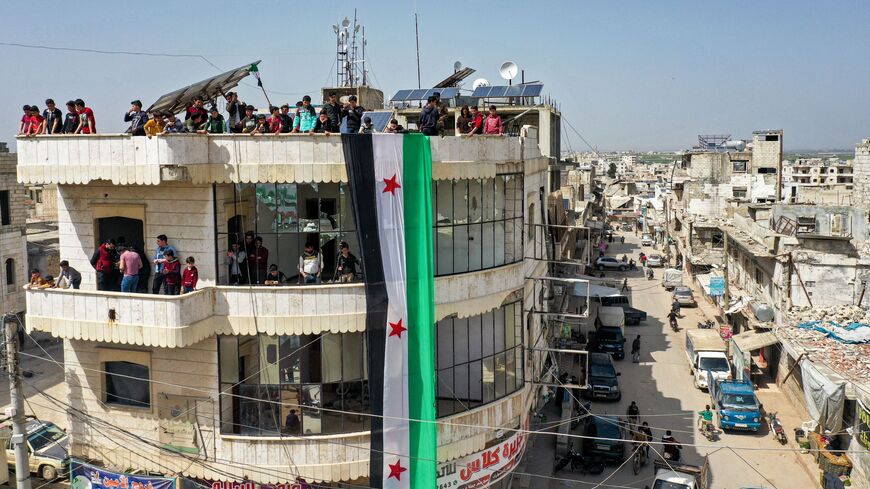
Protesters raise a giant flag of the Syrian rebels atop a building during a demonstration against Russia's invasion of Ukraine in the city of Binnish in Syria's northwestern rebel-held Idlib province. - OMAR HAJ KADOUR/AFP via Getty Images
Week in Review
@AlMonitor
April 8, 2022
The Russia-Ukraine-Syria connections
The Russian attack on Ukraine last month has diverted the international community’s already fading attention from the now 11-year civil war in Syria.
UN Secretary General Antonio Guterres, addressing the Security Council on March 23, said that Syrians feel "abandoned by the world" after a decade of war.
Russia is the primary backer of the Syrian government. Moscow’s military intervention in support of Syrian President Bashar al-Assad has secured Assad’s hold on power in a fragile and divided country.
Israel coordinates its Syria policy, including intermittent attacks on Iran and Iranian-backed armed groups, with Russia.
With Russia fully engaged with the war in Ukraine, Turkey, and perhaps others, may sense an opening to press their agendas in Syria.
UN: Syria destruction ‘has few equals’ in modern history
On March 11, Guterres reminded the Security Council that "the destruction that Syrians have endured is so extensive and deadly that it has few equals in modern history. … There must be no impunity."
"Hundreds of thousands have been killed, more than half of the pre-war population – somewhere in the order of 22 million - have been displaced," said Paulo Pinheiro, Chair of the Independent International Commission of Inquiry on the Syrian Arab Republic, on March 9. "More than 100,000 are missing or forcibly disappeared. Syria’s cities and infrastructure have been destroyed. Today the poverty rate in Syria is an unprecedented 90%; 14.6 million people in Syria depend on humanitarian aid.”
"Nearly 5 million children have been born in Syria since 2011," said UNICEF Syria Representative, Bo Viktor Nylund said in March. "They have known nothing but war and conflict. In many parts of Syria, they continue to live in fear of violence, landmines, and explosive remnants of war."
Syria ranks among the 10 most food-insecure countries globally, with “a staggering 12 million people considered to be food insecure,” Deputy Humanitarian Coordinator Joyce Msuya reported to the Council, while noting that the country’s economy is “spiraling further downward.”
Sultan Al-Kanj reports on the impact of higher food and fuel costs on Syrians in Idlib.
UN envoy: Parties ‘substantively far apart’ on flagging political process
The only way to break that deadlock, Guterres said, is through a credible political process that forges a sustainable peace and lets the voices of all Syrians be heard.
But the political process outlined in UN Security 2254 (2015) has been so delayed, and obstructed, that it seems out of time and place with Syria today. And that was before the invasion of Ukraine by Russia, one of the key players in the Syrian drama.
UN Syria Envoy Geir Pedersen told the Security Council in February that he is "very concerned that the constructive international diplomacy required to push this may prove more difficult than it already was, against the backdrop of the military operations in Ukraine."
The political negotiations are mostly dominated by Moscow, and by extension Damascus, with no countervailing US or Western engagement to give Pedersen the leverage needed to press ahead with his "step-for-step" approach to negotiations.
"The parties' positions are substantively far apart, and narrowing their differences will inevitably be an incremental process," Pedersen told the Security Council.
Turkey: ‘A new beginning’ in Syria?
For at least one player in Syria — Turkey — the Ukraine war may present an opportunity. Russia’s distraction in Ukraine could be a chance for Turkish President Recep Tayyip Erdogan to address his Syrian quagmire, which has been a drain on Turkey’s flagging economy, made worse by the Ukraine war (see the report by Mustafa Sonmez here).
Turkey currently occupies, via its military and proxy Syrian forces, approximately 3,400 square miles in northern Syria. Turkey also hosts close to 3.5 million Syrian refugees.
Erdogan has proffered a dialogue with Assad, while escalating actions in Syria to intimidate Kurdish-controlled areas and strengthening Turkish bases, as Fehim Tastekin reports.
Turkey considers the Kurdish parties aligned with the US-backed Syrian Democratic Forces (SDF) as terrorists, linked to the Turkish Kurdistan Workers Party (PKK).
Meanwhile, Turkey has sought to facilitate coordination by the former al-Qaeda-linked Hayat Tahrir Al-Sham (HTS, and ‘Liberation of the Levant’), which controls most of the northwest province of Idlib, with Turkish-backed Syrian factions, as Khaled Al-Khateb reports from Aleppo, as HTS seeks to eliminate or absorb more radical rival groups.
Moscow may have told Damascus to hold off on any major offensive against Idlib, according to diplomatic sources, although there have been a steady stream of Syrian government attacks in the province, adds Khateb.
Also seizing the initiative in Syria is HTS leader Abu Mohamed al-Golani, who has been making the rounds seeking to expand his popular support, as Sultan Al-Kanj reports.
Meanwhile, Turkey has warmed ties with the US, establishing a new "strategic mechanism" to facilitate coordination on trade, human rights, and security, including Ukraine and Syria, as Nazlan Ertan reports.
And Erdogan’s global diplomatic credibility has been bolstered in the West by his efforts to mediate between Russia and Ukraine, writes Semih Idiz.
US: ‘Pressing for accountability’?
Under the Caesar Syria Civilian Protection Act of 2019, "It is the policy of the United States that diplomatic and coercive economic means should be utilized to compel the government of Bashar al-Assad to halt its murderous attacks on the Syrian people and to support a transition to a government in Syria that respects the rule of law, human rights, and peaceful co-existence with its neighbors."
The Biden administration’s review of Syria policy, completed in December 2021, gives priority to the US-led campaign against ISIS; supporting local ceasefires and humanitarian access throughout Syria (which requires coordination with Russia); "pressing for accountability and respect for international law while promoting human rights and nonproliferation, including through the imposition of targeted sanctions; and supporting a political process led by the Syrian people, as envisioned in" UNSCR 2254.
Dropped, or deprioritized, following the Biden review, is the Trump administration’s objective of seeking the withdrawal of Islamic Revolutionary Guards (IRGC) and IRGC-backed forces in Syria.
Four US soldiers received medical attention for “minor injuries” and possible brain trauma following a rocket attack on a US-led coalition base in eastern Syria, likely attributed to Iran-backed paramilitary groups, the first such attack since January, Jared Szuba reports. The US has approximately 900 troops in Syria as part of its Operation Inherent Resolve, the US-led ‘D-ISIS’ mission in Syria and Iraq.
The Biden administration continues to reject initiatives by Arab states to normalize relations with Assad, who made an official visit to the UAE in March. But these efforts are nonetheless gaining traction, if slowly, as George Mikhail reports from Cairo.
The chairs and ranking members of the Senate Foreign Relations and House Foreign Affairs Committees wrote a letter to US President Joe Biden in January calling for "consequences for any nation that seeks to rehabilitate the Assad regime and to ensure all countries understand that normalization or Assad’s return to the Arab League are unacceptable."
Mostly absent from the UN diplomacy on Syria, the US has instead focused on keeping open the remaining UN humanitarian corridor at the Bab Al Hawa crossing. UNSC Res 2585 (2021) expires in July, and Russia could veto. Diplomatic sources indicate, however, that most aid through the crossing is in any case facilitated by one the ground NGOs, and that Turkey controls a number of alternative border crossings into Syria.
Elizabeth Hagedorn, on this week’s On the Middle East podcast, suggests that the focus on alleged Russian atrocities in the Ukraine war could spark similar calls for accountability for war crimes in Syria.

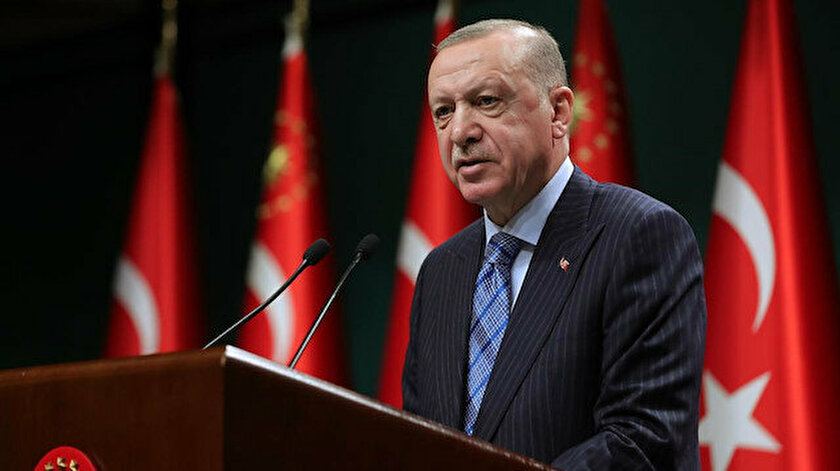

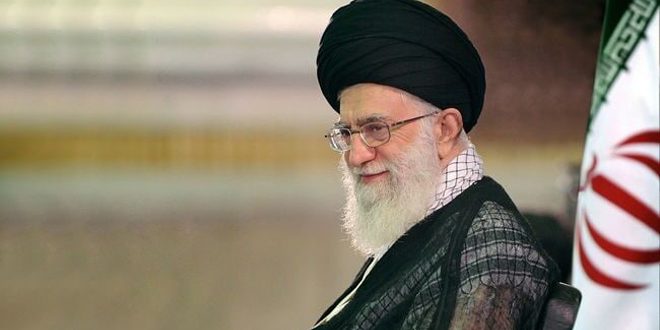
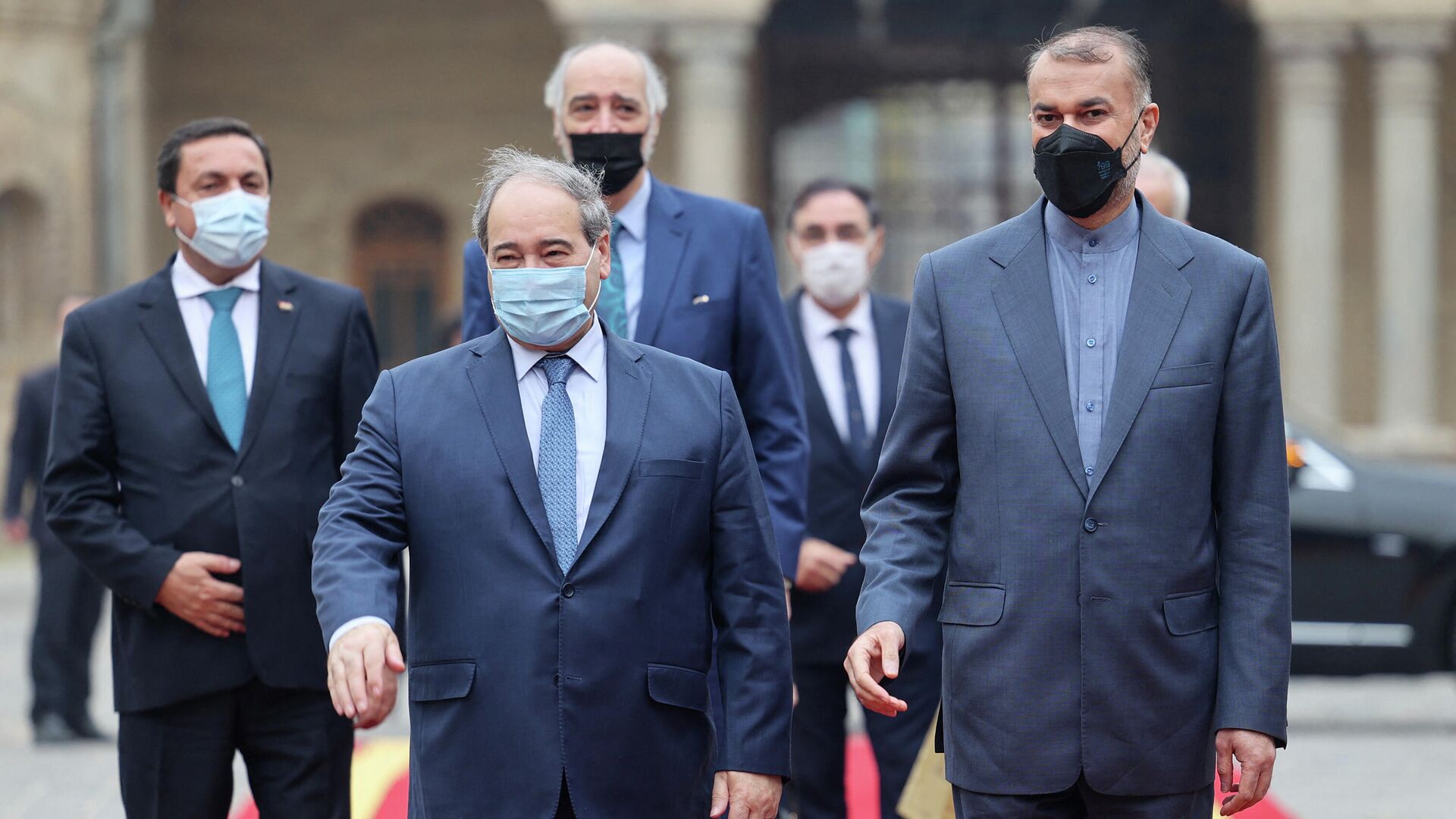




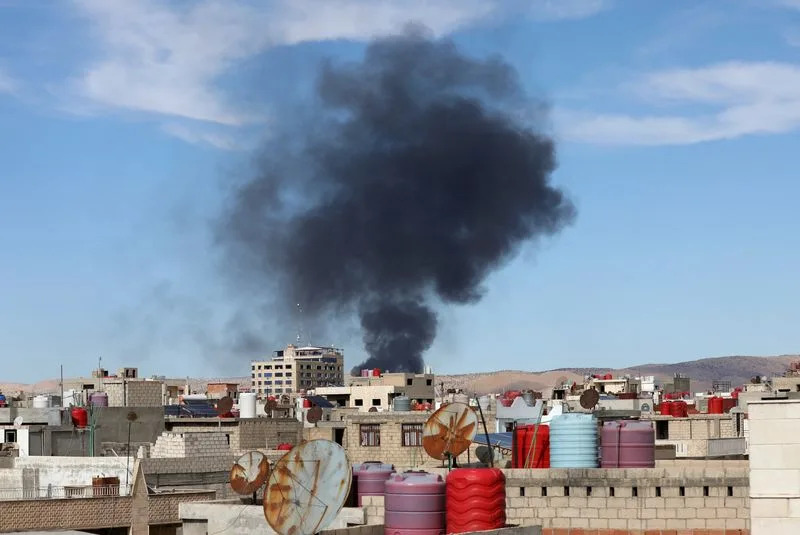
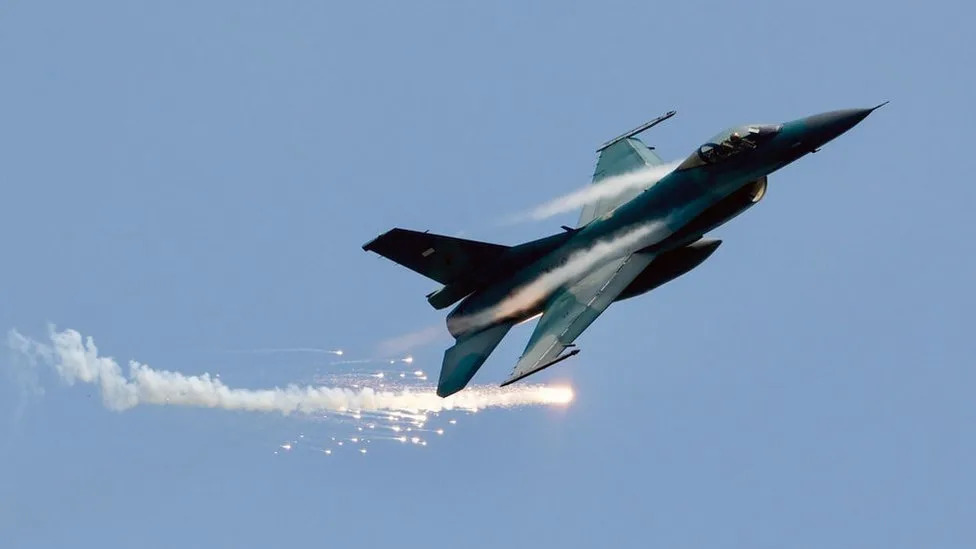
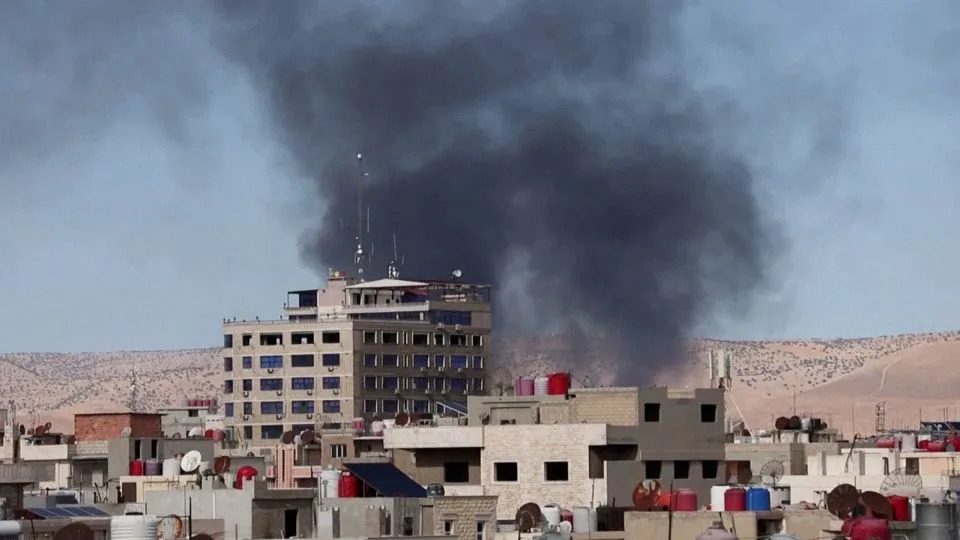

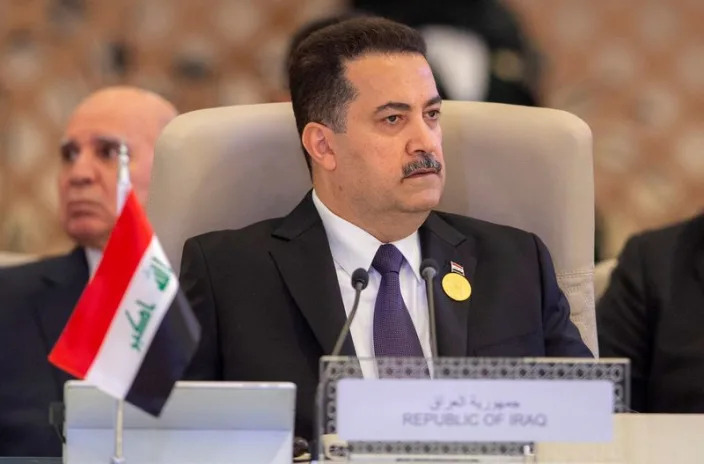
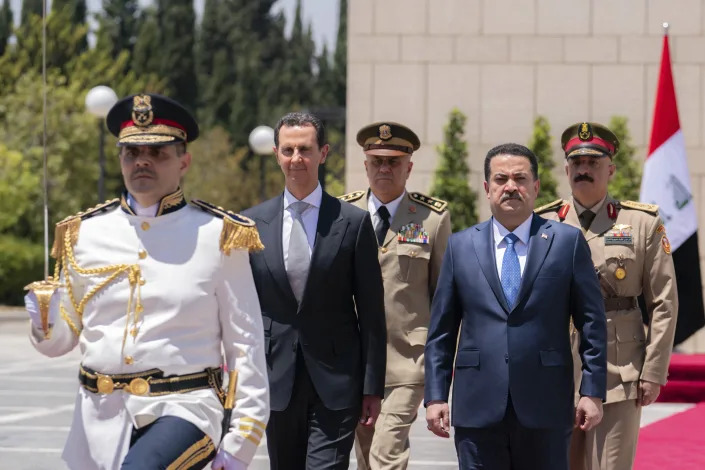
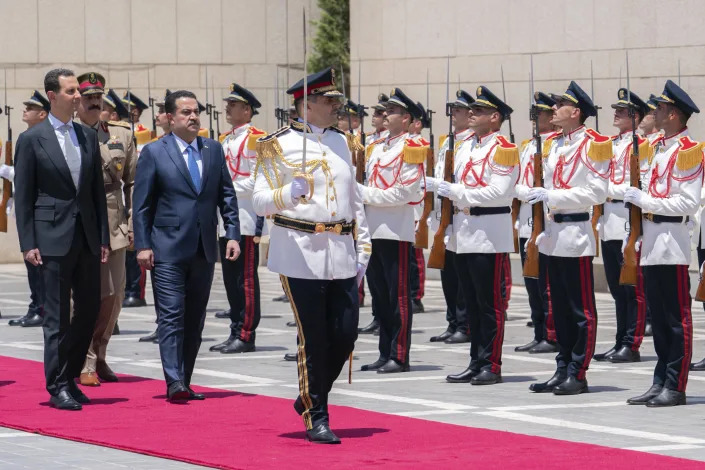
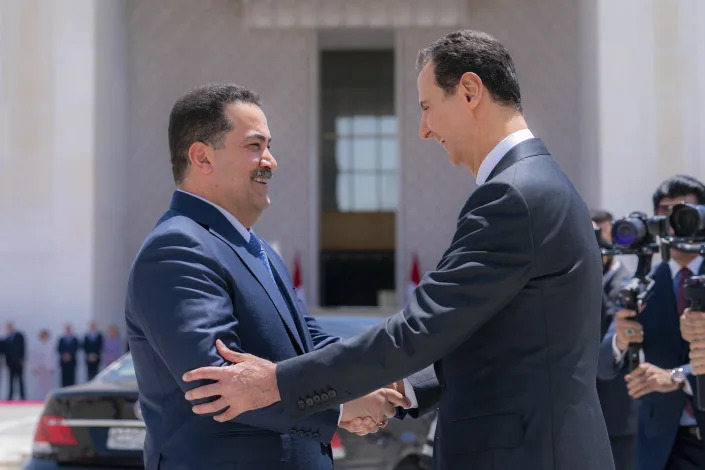
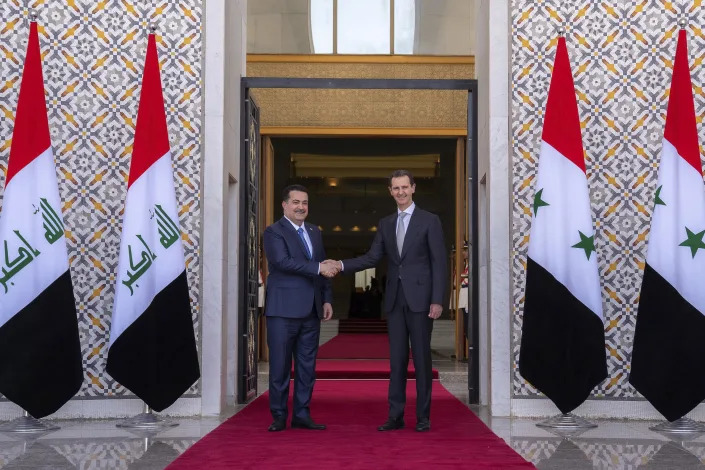
:quality(100)/cloudfront-us-east-1.images.arcpublishing.com/thesummit/4AR56T2675H3NK2XN7ANI7LC4E.jpg)
:quality(100)/cloudfront-us-east-1.images.arcpublishing.com/thesummit/OB2QI6EUXBDAPEYH6HHDHVF42Y.jpg)
:quality(100)/cloudfront-us-east-1.images.arcpublishing.com/thesummit/TY4WZSE2QZHXJJBJCH52HLBH3U.jpg)
:quality(100)/s3.amazonaws.com/arc-authors/thesummit/fb0c386f-0b3c-42b7-a3f0-939a9d023b7a.jpg)